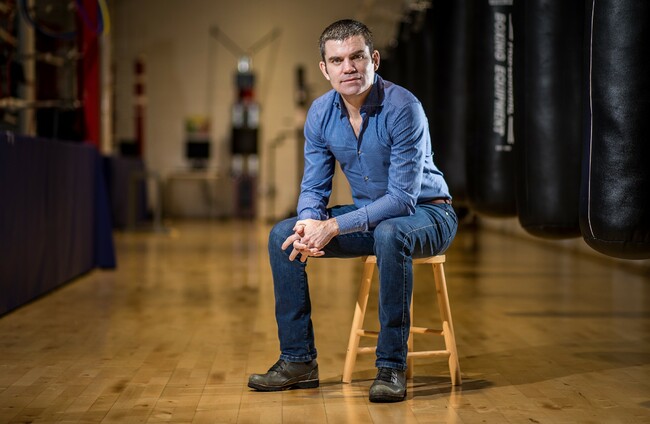BERNARD DUNNE HAS dismissed criticism regarding IABA selection policy following this month’s Irish Elite Championships, which saw seven of the champions crowned during February’s edition miss out through injury despite being officially listed as entries.
Per IABA rules, boxers must ‘enter’ the Elites in order to be eligible for selection for major international competitions, the next of which is an Olympic qualifying event in London in March.
2018 lightweight world champion Kellie Harrington, reigning European champion Kurt Walker and Rio Olympian Brendan Irvine were among the champions absent from the first-round draw earlier this month, along with young standouts James McGivern, Gabriel Dossen, Michael Nevin, and international-level super-heavyweight Dean Gardiner.
There was discontent murmured by several entrants in their respective divisions, many of whom were unsold on the legitimacy of the injuries cited and felt they had been wrongly relieved of the chance to seize pole position ahead of team selection for Tokyo 2020 qualification in just over four months’ time.
IABA High Performance Director Dunne, however, shot down such theories, positing that if the team was already selected, only one fighter per division would be training at the High Performance Unit in Abbotstown.
“We’ve got a team, now, where there’s a challenge in certain weight divisions, and that’s what you want,” he told The42. “That’s exactly what I want.
“It’s our job to make sure that we pick the best possible team to go away.
“People will just come up with different agendas but we’ve had hand operations, we’ve had knee operations, we’ve had foot operations.”
Dunne wouldn’t specify which surgeries were performed upon which specific boxers in the interest of medical privacy, but reiterated: “We’ve had some serious injuries. Some of those athletes may not even be back for the first qualifiers. So let’s deal with it then. We’ve got to manage those athletes back into the programme.
“Kellie [Harrington] is not too far away,” he added of the Tokyo medal hopeful. “Kellie’s probably another two, maybe three weeks away, from being fully back into the programme. But we’ve other athletes who are a lot further down the line than that.
“We’re looking at the majority of them being back by January, but just because they’re back by January doesn’t mean they’re ready, either. You could start punching, and all of a sudden the hand goes again. So we’ve got to manage that return-to-play [protocol] — we can’t just throw them straight into an Olympic qualifier. We’ve got to make sure that we’ve prepped them the right way, that we’ve given them every opportunity, and that everybody’s been tested.”
The likes of Dundalk’s Amy Broadhurst, who is Harrington’s predominant chaser at 60kg and was anointed Elite champion by default in the Dubliner’s absence last Friday, have called for traditional box-offs to take place ahead of squad selection for London in the spring.
The consensus has been that these box-offs remain unlikely, and that the travelling contingent for March will be determined by way of ongoing assessment in the HPU — although Dunne stressed that there is no particular timeframe in which such conclusions shall be reached.
He also rejected the suggestion that Ireland’s selection process has deviated from using box-offs altogether as a means of finding the top dog where selection may remain a tight call.
“It hasn’t — there’s still the potential for box-offs,” said the former professional world champion. “It states that in the policy.
Where we see fit to create a box-off, there will definitely be box-offs. But again, it’s what-ifs at this moment in time.
“That’s what you’re talking about. I’d rather deal in actual facts.
“We have everybody back in [the HPU] next week, 3 December — everybody from Nationals. And those who can participate from the injury list will be back in as well. And we’ll see where it goes.
There’s no timeline for assessment. Winning the national championship is one moment in time. We want athletes who are continuously performing, that are continuously pushing themselves and challenging themselves. If people are missing training sessions, if people are late for training sessions, if people are not managing their weight — all of these things have to be taken into account.
“We’re looking to make a team that has a culture of seeking excellence and has a culture of continuously performing at the highest level. We’re not looking for people who want to cut corners. And you see all of that when you have them in over two or three weeks.
How do you fit in as part of a team? There’s no point in having a great athlete if they piss off everybody else, or nobody else gets to perform because they’re upsetting everybody.
“We have until March next year [to select a team], so we’re okay. There’ll be a lot of factors taken into play and we’ll make a decision closer to the time.
“The days of us just having one athlete — we’re trying to move completely away from that,” Dunne added, alluding to the recent era in which Ireland’s flagship operators tended to represent their country at every major international provided they were fit.
The days of just having one athlete who goes everywhere, who is ‘that’ person, who automatically gets picked. That’s gone.
“We want to create internal challenge. We want those who are perceived as number twos to see that they have a chance to step in; if they can drive on, and push and push and push, they can get in.”
But would the flipside, then, be that it might become more difficult for potential medal prospects to garner consistent, significant experience in the high-pressure environment of international competition?
“No,” answered Dunne promptly when asked as much. “No, I wouldn’t see it like that.”
Instead, he believes the classes of 2020 and beyond will earn plenty of stripes by way of the IABA both hosting and travelling to international camps, where Irish boxers will continue to mix with elite foreign talent on a regular basis — a continuation of some of the groundwork laid before his two-and-a-half-year reign atop Irish amateur boxing.
Dunne also revealed that he frequently speaks with a couple of the High Performance programme’s forefathers, Gary Keegan and Billy Walsh, both of whom he has been friends with since their own involvement in Irish boxing.
Walsh is currently the head coach of the USA boxing team — rivals of Ireland’s on the world stage — while Keegan’s prints can now be found on umpteen Irish sporting setups across the country.
“I’ve got really good people around me and that’s helped,” Dunne said of his tenure. “We have a really good support team here, like Rachael Mulligan who near-enough runs the programme and assists me in nearly everything I do. Zaur Antia — I mean Zaur is the best coach in the world, a genius. And you have all the coaches, then, that support him, like Dmitry [Dmitruk], Eoin Pluck, John Conlan, Damien Kennedy — all fantastic quality in their own right, and together they make a really good squad.
And then you have Billy Walsh and Gary Keegan who are my predecessors, who I’m great friends with. We would chat on a weekly basis. They’re good guys — we’re friends more than anything.
“Like, in the last 12 months, we’ve won a World gold medal, we’ve had eight major European medals — two of them gold. For any squad, and especially for a squad of our size, that’s a good return.
“We’re not that far off where we want to be, and it’s great that there’s new young talent coming in because we can’t just look at 2020 — we’ve got to be looking at 2024 and even 2028 and what that pathway looks like.”
Dunne was speaking at an even to announce the Sport Ireland Institute’s partnership with SAS, which is helping the SII access and analyse data more efficiently and effectively, enabling faster and more objective decision-making, optimising the organisation’s time and resources. SII will use data analytics to complement and enhance preparations in the build-up to major sporting competitions, including the Tokyo 2020 Olympic and Paralympic Games.






